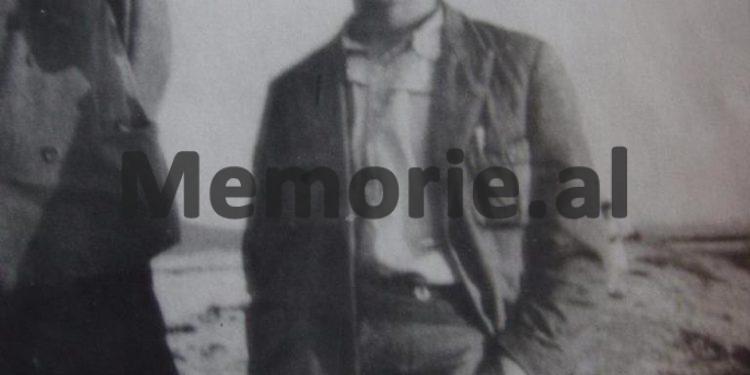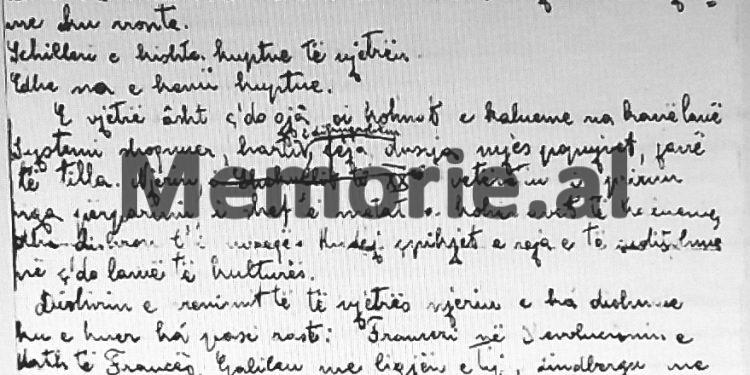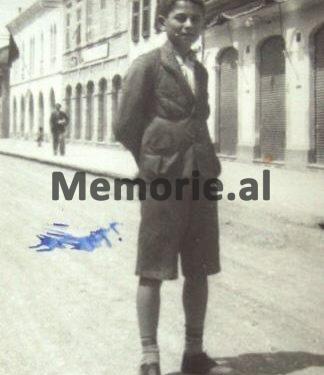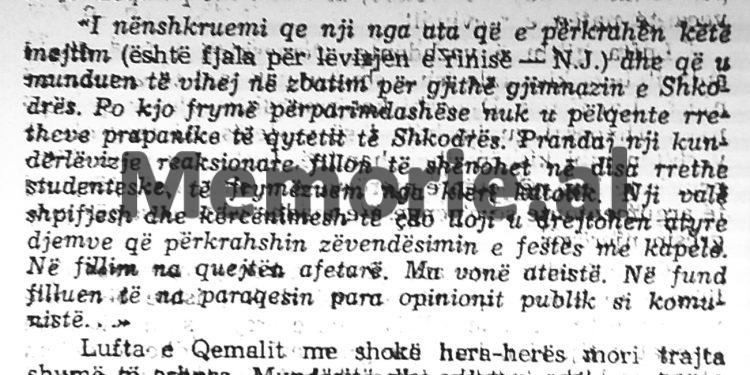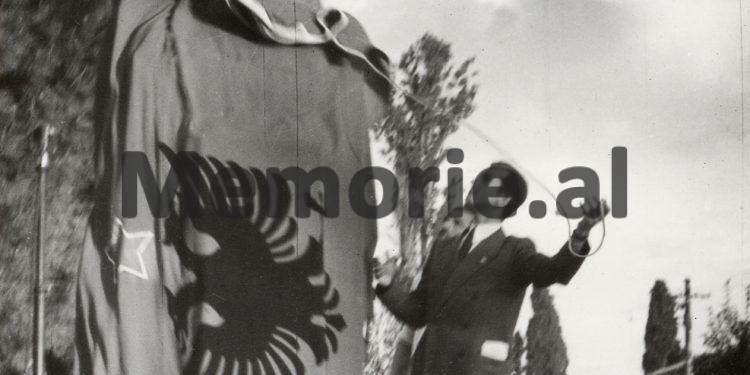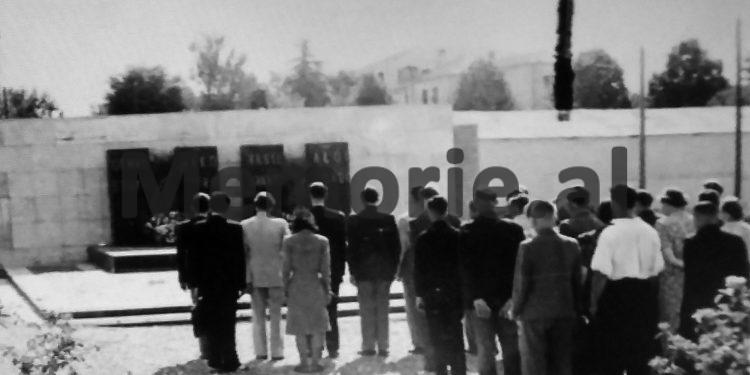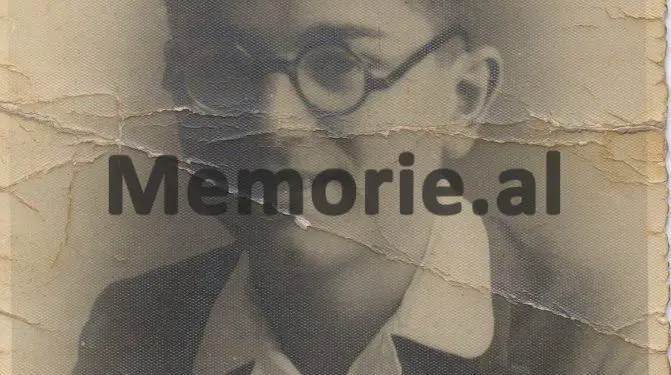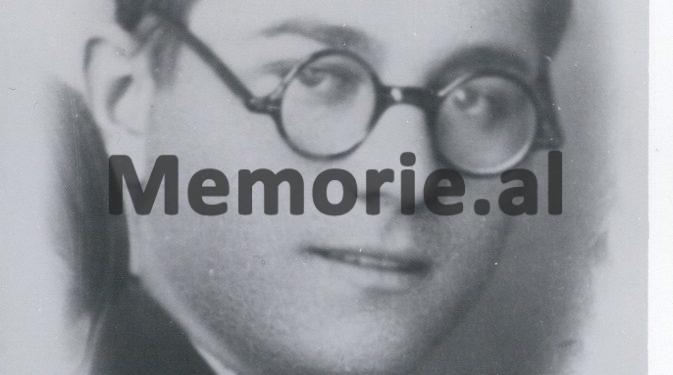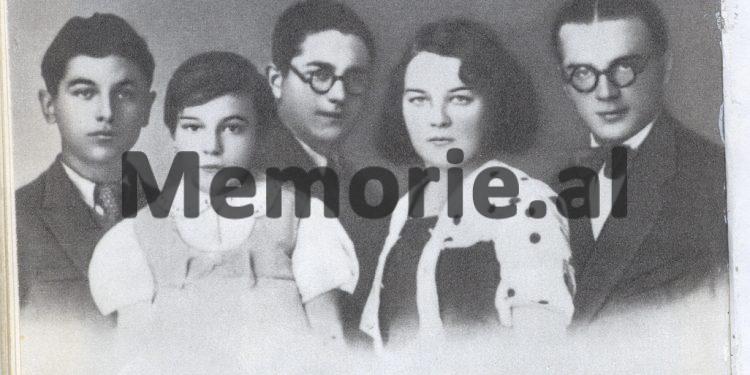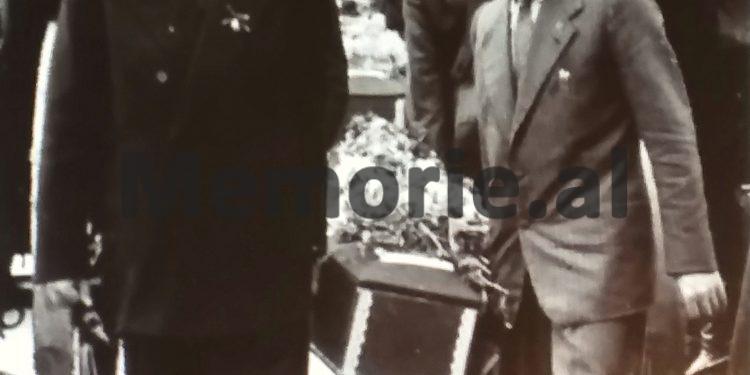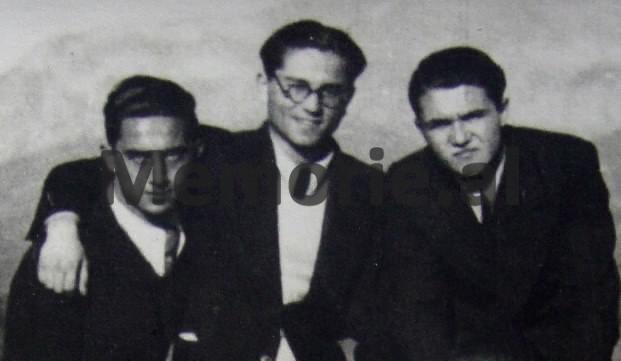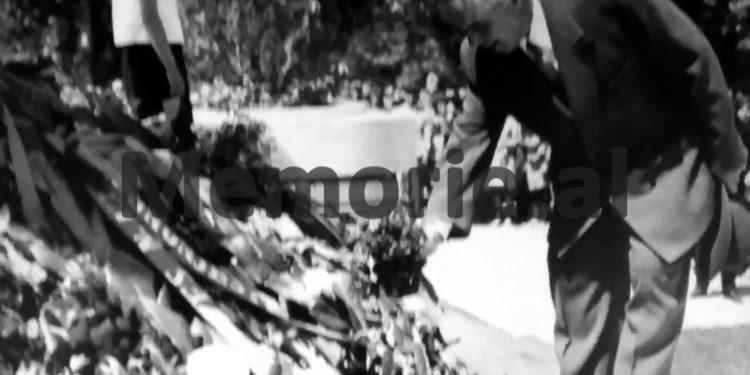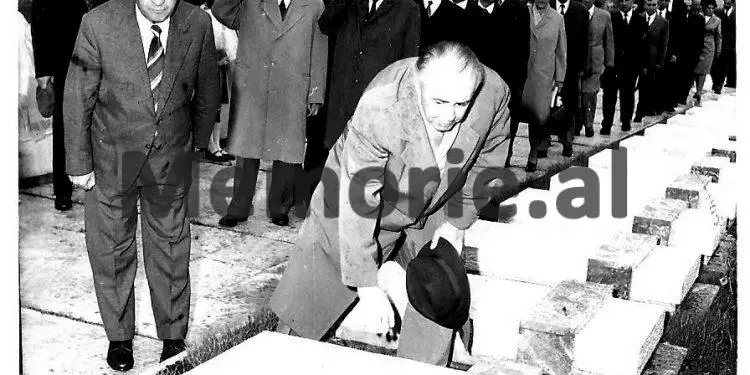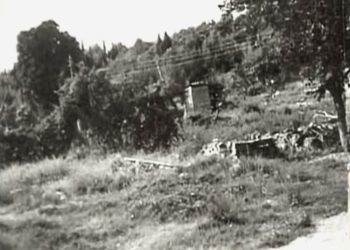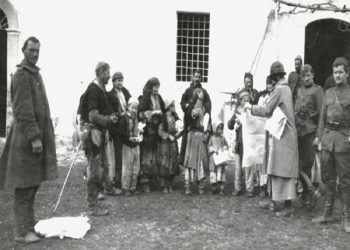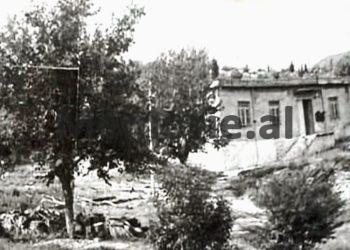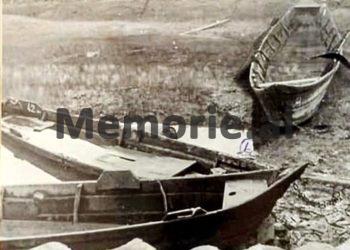Dashnor Kaloçi
Memorie.al publishes the unknown story of the design of Qemal Stafa, entitled “The old is ugly, times are changing, a new life is flourishing in ruins”, which he had written in June 1935, when he was a student in the class of fifth (with the system of that time) of the high school of Shkodra. How that draft was manipulated by the official historiography and propaganda of the communist regime of Enver Hoxha for political purposes and was never published in full in the books that were written about “People’s Hero, Qemal Stafa, as at the end of that draft that Memorie.al he is publishing it and with the relevant facsimile, he had written: “We Albanians will also destroy the old one. Above it, we will raise the red flag of brotherhood, culture, and wealth. We have confidence in ourselves, so we dare. It is the heart of a fifteen-year-old who speaks to you.
In addition to May 5, which the communist regime before the 1990s marked as a symbolic day to commemorate the “Martyrs of the Fatherland”, in honor of the murder of the idealistic 21-year-old boy who was then in charge of the Albanian communist youth, The name and figure of the “People’s Hero”, Qemal Stafa, before the ’90s was very famous also because of his famous design with the title: “The old is ugly, times change a new life flourishes ruins”, which he had written in June 1936, when he was in his fifth year (with the system of that time) at the high school of Shkodra.
This draft of the 15-year-old student Qemal Stafa, (the son of the colonel of the Zog Monarchy, Hasan Stafa), the official historiography of the communist regime of Enver Hoxha, not only never published in full and never gave a copy to the family. his, but used it for its propaganda purposes in the function of the political line that that regime pursued by distorting to some extent the ideas and spirit that pervaded that design. This was because, at the end of that draft, student Qemal Stafa wrote: “We Albanians will destroy the old one as well. On it, we will raise the red flag of brotherhood, culture and wealth. We have confidence in ourselves, so we dare. It is the heart of a fifteen-year-old who speaks to you.
So, as can be seen from the closing of this draft (which is clearly seen from the relevant facsimile), in addition to “brotherhood and culture”, Qemal Stafa there spoke and preached about the “rich”, which the communist regime of Enver Hoxha and he fought in all ways and was against the “rich”, even the “rich”, were the “beys and aghallars” identified as those who had “drunk the blood” of the people ?! Given the fact that since the day it was written in June 1935 and throughout the period of the communist regime, that draft has never been published in full, Memorie.al is publishing the full version as written by Qemali in at that time and in addition to him, we are publishing some parts of the comment made to him in the book “Qemal Stafa” before the ’90s (by NJ), which was published under the strict care and control of Nexhmije Hoxha and also with the approval of Enver Hoxha.
Comments on the compilation of the book on Qemal Stafa, published before the ’90s
“We Albanians will ruin the old one. We will raise the red flag over it. “We have confidence in ourselves, so we dare.” The seed of new thoughts did not delay to bear fruit in Kemal. Within a short time, fundamental changes took place in his understanding. Although from indirect and sometimes unclear sources, despite the intuition that characterized him, he managed to grasp some of the main principles of Marxist theory and declare these as his ideals. Conscious appropriation of these principles, which has just begun at this time, is the foundation on which all of Qemali’s revolutionary activity will be built. How quickly he penetrated revolutionary theory and Marxist dialectics, in general, is evidenced by the discussions, conversations, and thoughts he displayed at this time in the circle of close friends. Of course, these have not reached themselves in the form of detached and truncated memories, but the most complete document that shows this early formation of Qemali is the drafting: “The old is collapsing, times are changing, a new life is flourishing in ruins.” We call it to design, since Kemal wrote it as a school assignment, but in fact, it was a kind of manifesto of his revolutionary worldview imin He wrote the draft in June 1935, when he was a fifth-grader. The theme was taken from the famous drama “Wilhelm Teli” by Frederik Schiller. The play was published a year earlier in Albanian and was received with great sympathy by the youth, especially the school one. Qemali valued Schiller’s work for his rebellious spirit, for his strong sense of freedom that he had in mind and which resonated in his troubled soul. On the other hand, the drama pushed him to make parallels with the state of Albanian society, with the misery and slavery that had plagued the lives of the people. then all that range of important thoughts, which Qemali lays down with great civic courage. With this courage, he openly says that he understands with the old: “The old is all that the past times have left us. The social system, the former art, the religion, the dasia, among the peoples are like that. Qemali has clear materialist concepts and tries to treat everything from these positions. By taking social order, art, religion, etc., as part of the superstructure, he sees them as historical phenomena, having their inevitable birth, development, and death. From such a height, 15-year-old Qemali tries to watch the theater of human society, convinced that the old one is coming one day and is being destroyed to make way for the new one. And to prove this, as always, he addresses the history of science: “The desire to demolish the old was witnessed by the Frenchman with the great French Revolution, Galileo with his law, Lindbergh with his trip from America to France, Russia. with the change of the associated system… “Qemal’s political tendencies appear flat when immediately after these lines, he marks in parentheses the threatening call:” Bourgeois, open your ears well! ” He goes on to give a more concrete account of his thoughts when he says that in the old society in which he lives, exploitation and injustice reign, and a difficult situation comes because: “Wealth is the point of support for all actions. , it’s a bad omen (open your eyes as much as you want capitalist!). One of us has billions, the other has no two. Some have large tracts of land for planting, while their relatives do not even have bread (I say eat bread!) ”The young high school student notices revolted that human social history is the history of human slavery. Despite its shape, slavery has essentially remained the same. He cites the capitalist system as an example, which has found refined ways to exert pressure and exploit the masses. Slavery has only changed its form: “Instead of the slave leader’s whip, it is the banker’s pen: instead of the cashier again, it is the policeman who registers public women, victims of society’s poverty and injustice. I’m not talking about the swords of janissaries replaced by electric chairs. ”Then what should be done? Qemali raises this historical question and in order to give an answer, he finds the key in the revolutionary theory: new thing) ”. He is convinced that this path must be followed, as it takes into account a major historical phenomenon that has occurred in the world. The Russians did it on time: the example of the old collapsing. Immediately after this convincing fact, the unwavering faith is expressed with the words: “We will do it too”.
Complete design of Qemal Stafa
Qemal Stafa
“The old is collapsing, times are changing: a new life is flourishing ruins”
High words, meaningful words. For many years now, the duel has flowed from the pen of a great idealist, Schiller, whose soul, eager for new things, among which the freedom of peoples occupied the first place, gave way to devotion to the dry desert of idealism does not look like the old world where it lived. Schiller understood the old. We have understood that too. The old thing is that everything that the times have and the flowers have left us. The social system, the intermittent map, the religion, the dasia between peoples, are such. Man himself, inclined to the advancement of the chief, blames the shortcomings of the past and seeks to correct them. Here are the new and weird highlights of the culture.
Man has witnessed the desire to destroy the old when and when there was a case: Frances in the Math Revolution of France, Galileo with his law, Lindbergh with the trip from America to France, Russia with the change of the associated system… (bourgeois open your ears good) Now let’s fine-tune all the old stuff. The sociable companion system is the same as mine years ago, we changed it in a few points but so little that it doesn’t stand out. The world is divided into continents, these into states, states into cities and provinces until we reach the man and have his ideas. Wealth, which is the point of support for all actions, is badly divided (open your eyes as much as you want capitalists). One has billions and billions, while the other has no two. Some have plenty of lands to sow, and their relatives have no bread to eat.
They say that slavery has disappeared. No, it has not disappeared, but it has taken on a different shape, that of help. Instead of the whip of the leader of the captives, he is the pen of the banker, instead of Kesler agai, he is the policeman who registers public women, victims of poverty and injustice of society. I’m not talking about the swords of the Janissaries replaced with eggs in their arms, about Giljotina being replaced by an electric chair.
We have inherited all of this from time immemorial because they have their source in the division of wealth. We have inherited all of this from time immemorial because they have their source in the division of wealth. May wealth is shared with justice, and may all the people of the world work together for one purpose, how different life would be! Official statistics clearly show that the most honest blood feuds, the biggest thefts, have been due to vobegs. From this, we see that it is necessary to change the contemplative division of wealth (the old thing) and replace it with a straightforward, one-sided division (the new thing). The Russians have it for a long time: this is an example of the old collapsing.
We will do it too. Education, that light of the peoples as Victor Hugo called it, was given only to the princes of the nobles. Today, the son of the worker stays in the same boat with the son of the minister who milked him: see for sure that the world is disgusted with the old and loves the new. Let’s look at fen, the opium of peoples. In the old days, people did not understand the advice of its leaders: To make Arabs wash, and not pay taxes to the caliph, was the need of a Muhammad to preach to the ignorant people that there is, there is, a God who leads them to hell, those who do not wash, who do not do gymnastics, and do not regularly pay taxes. So far so good. But let’s look at these others. Under the guise of these rules how many vile things were done. How many times did the crowds of people blinded by the leaders of her religion become captives of a tyrant? Give to Caesar what belongs to Caesar and what belongs to God! ” How beautifully these words reflect the purpose of religion. Where there is a church, there is a king.
The twentieth century is destroying the old. Instead, it adds secular schools, left-wing by the state, fills the libraries; praises the sciences (the greatest enemies of religion: where are you Galileo before the pile of wood?) He transforms churches and mosques into anti-clerical museums. Let’s come to the map. The map so far, which had nothing but a beautiful shape, does not meet our needs. I need a beautiful poem in the form of a poem, but they put it in the idea! A painting with beautiful paints, but without an idea?
Contemporary poetry, in addition to the form, also has the idea, the idea that it fights the suffering of the worker, the toil of the farmer. Contemporary painting does not have as much beauty of shape as of ideas. Don’t look for beautiful women in modern frames, idyllic scenes, angels surrounded by angels and I don’t know how many other tales. Instead, look for vivid colors in a hammer when they set up a large box of champagne bottles.
We Albanians will also destroy the old one. On it, we will raise the red flag of brotherhood, culture and wealth. We have confidence in ourselves, so we dare.
It is the heart of a fifteen-year-old who speaks to you.
Shkodër 19 June 1935
Memorie.al





